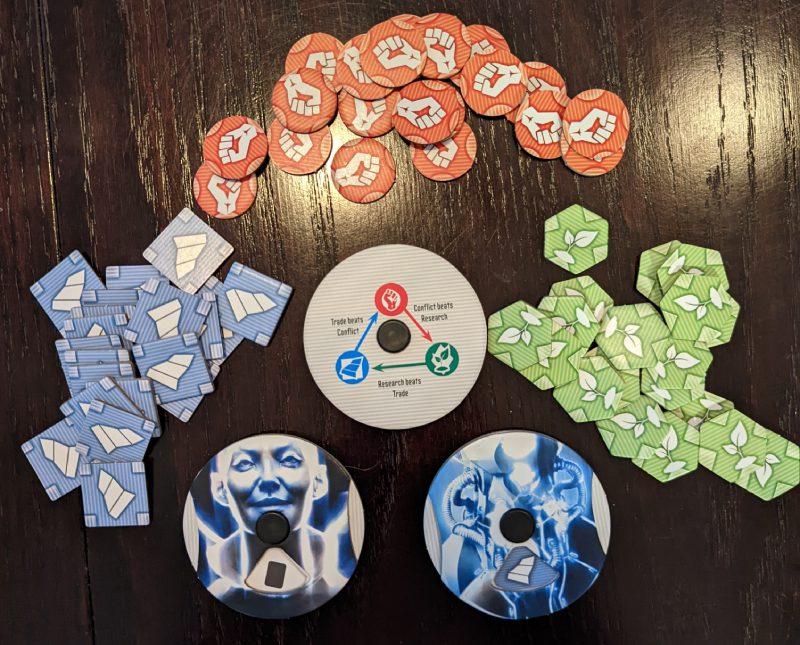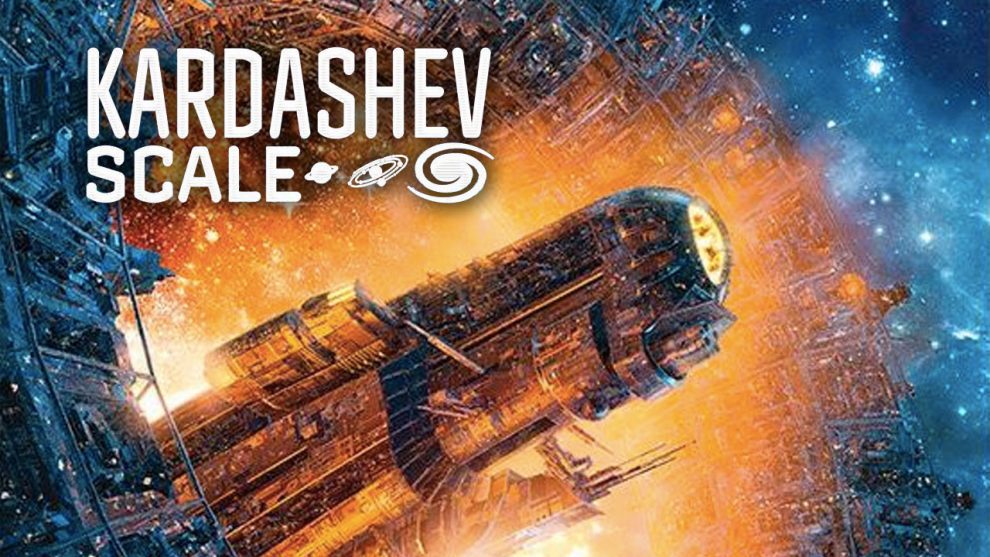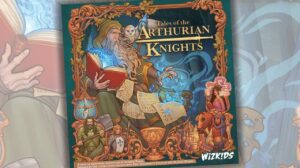Disclosure: Meeple Mountain received a free copy of this product in exchange for an honest, unbiased review. This review is not intended to be an endorsement.
I had no idea what the Kardashev Scale was when I read about this game. What grabbed my attention was the two words printed on the front cover box: Engine Builder. Anyone who has followed me for the past two years knows that Engine Builders are one of my many weaknesses in gaming. Of course, I had to take a look at this one.
Out of curiosity, I did some research on the Kardashev Scale. By research, I mean watching YouTube videos, and I have to say that I was surprised to see that this theory isn’t utilized more in science fiction stories.
Kardashev Scale is a system of measuring technological progress which was developed by Soviet astronomer Nikolai Kardashev. Nikolai believes that a civilization’s advancement can be judged by the amount of energy it can use. Type 1 civilizations would utilize the energy of their planet, while Type 3 civilizations would utilize the energy of their galaxy.
Theory crafting
This theory is the string that ties this game’s narrative together. You and your friends are alien civilizations, and it’s a race to 25 victory points. Players gather resources then spend them to purchase Advancement cards. Using these cards, you create a pyramid in front of you, beginning with Planetary cards, then Stellar cards, followed by Galactic cards. A simple premise for a game in a small box.
This simplicity bleeds into the game’s rules. Each round starts with a Summit. Using your cardboard dial, you will pick one of four choices. Three of those are related to the three resource types, while the fourth option is Advancement. We’ll get to that fourth option in a bit.
Everyone makes their decisions in secret and reveals their choices simultaneously. You will compare your choice with both of your neighbors’ choices. Every resource type has a relationship with one other. Pick the red Conflict resource, and you will beat the green Research but will be countered by the blue Trade. Yes, this is a rock-paper-scissor system.
If you beat a neighbor, you get two resources. Tie? One. Beaten? Zero.

No Lizard or Spock here
The result of this system means that you will, on average, get two or three resources per round. However, there is always that possibility of getting four resources back-to-back or no resources at all. You might at first think this is extreme, but it is a result of your decisions. If the outcomes are not in your favor, it could be that you are easier to read than you might expect. It is one of the few games where accountability plays a significant role in your success.
The fourth option is Advancement. You sacrifice your opportunity to grab more resources, and your neighbors will automatically beat you. For the exchange, you add a card to your pyramid from the central pyramid after paying the resource cost. Like any pyramid, you need a base and build your way upwards. Your first layer will be Planetary, the second layer being Stellar cards, and the third final layer of Galactic cards.
Besides the cost, every card has a victory point value and some cards will have an ability. These abilities can be anything from end game scoring for collecting certain cards, some sort of income every turn, or special resource exchange. This is where the “engine building” portion comes in.
Unfortunately, the engine building in Kardashev Scale is a bit lackluster.
Running out of fuel
The most exciting aspect of the engine builder genre is exploring all the tools and mechanisms the designer has provided. Like a child with a toy box, I can create whatever I desire by mashing things together to see if it works. It gives a sense, or at least the illusion, of feeling clever.
Kardashev Scale’s primary downside is that it doesn’t give you much scope for experimentation. Most of the abilities are limited to exchanges, income, or set collection bonuses. Some aggressive cards allow you to destroy a card or steal resources, but not much else. These tools are so sterile that you can perform surgery with them.
Furthermore, most of the Galaxy cards, the ones that are at the top tier, have no ability. You would assume this is where the crazy could happen but nope, just more points. If Kardashev Scale’s engine building were a spice, it would be flour.
There are other engine builders out there that can be played in a short time frame, such as Race for the Galaxy, Res Arcana, or Jump Drive. After writing that sentence, I realized that all I did was list Tom Lehmann games and I’m not even surprised.
Does this make the game bad though? No. You just have to look at this game through a different lens.

Pyramid Hustle
As I’ve mentioned in my Smartphone review, I enjoy games where you are trying to guess your friends’ decisions through simultaneous reveals. I can’t explain it; all I know is my brain gets marinated in dopamine when I correctly predict the people around me.
Kardashev Scale does a fantastic job of anchoring this concept to the players. At first, it might appear random since all three decisions are equal. As the game progresses and players pick their cards from the almighty pyramid, the values and rewards of the three resources shift with their choices. Like carving your initials on a tree, your decisions have a permanence to them.
To throw one scenario, you could be looking in my direction and trying to decipher my intentions.
“Every round, he gets a green token…”
“If he wins with a red, he gets another red token..”
“And he can use two green tokens to exchange for any other token!?”
Mind you, this is just me. You still need to worry about your neighbor on the left, and guess what? We are looking at your cards as well. Even though each round consists of only four simple decisions, understanding the context of the situation requires an archaeologist’s expedition of your opponent’s pyramids.
Rough launch
The downside of this is that you may find yourself advancing in inches instead of light years if your opponents are constantly predicting your moves. During my first game for this review, I barely reached above 10 points because I was so easy to read. The players I played with for this review also expressed identical concerns. I don’t mind this at all since I’m a competitive player, but some players may take issue with it.
Another issue that my review group also noticed was player scaling. Under no circumstance should this be played by five or six people. Besides downtime, which is odd for a game with technically no turns, there are not enough resource tokens to accommodate that number of players. During our four player sessions, we almost ran out of resource tokens. The rulebook doesn’t even bother mentioning what to do with these component limitations. At least the extra player dials can be used as references for the rock-paper-scissor relationship.
However, I confess that I am biased towards games that emphasize reading your friends. It would have been nice if the engine building portion was a bit more daring and allowed players to really mess around with its systems. In that respect, it falls short, but it can work if you like guessing your friends, just don’t expect to be blown away.












Add Comment